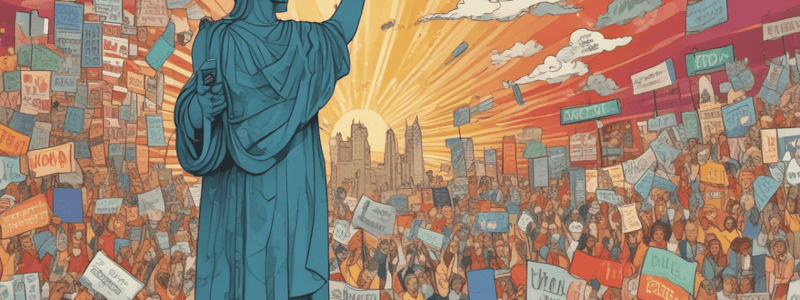Podcast
Questions and Answers
What is the primary challenge in defining economic equality?
What is the primary challenge in defining economic equality?
- Distinguishing it from political equality (correct)
- Understanding its implications for economic systems
- Identifying it with equality of possessions
- Ensuring it is a politically classless society
What is the author's revised understanding of capitalism based on?
What is the author's revised understanding of capitalism based on?
- The concept of economic democracy
- A reevaluation of the injustices of nineteenth-century capitalism (correct)
- Views of social philosophers and reformers
- Critiques from Marx and Engels
What is the prerequisite for the progressive political enfranchisement of the working classes?
What is the prerequisite for the progressive political enfranchisement of the working classes?
- The abolition of all forms of economic servitude or dependence
- The possession of sufficient property to obtain subsistence
- Universal suffrage in democratic republics
- Economic emancipation from slavery and serfdom (correct)
What does economic democracy aim to achieve?
What does economic democracy aim to achieve?
What is the core criticism of capitalism by social philosophers and reformers?
What is the core criticism of capitalism by social philosophers and reformers?
What is the primary factor that enabled economic freedom in the pre-industrial past?
What is the primary factor that enabled economic freedom in the pre-industrial past?
What is the distinct characteristic of the ideal of political democracy?
What is the distinct characteristic of the ideal of political democracy?
What is the primary concern of Marx, Engels, and their followers?
What is the primary concern of Marx, Engels, and their followers?
What is the relationship between economic freedom and political freedom?
What is the relationship between economic freedom and political freedom?
What is the ultimate goal of economic democracy?
What is the ultimate goal of economic democracy?
What is the author's perspective on the injustices of nineteenth-century capitalism?
What is the author's perspective on the injustices of nineteenth-century capitalism?
What is the primary role of government in a socialist economy?
What is the primary role of government in a socialist economy?
What is the implication of the author's revised understanding of capitalism?
What is the implication of the author's revised understanding of capitalism?
What is the primary difference between the ideal of capitalism and nineteenth-century capitalism?
What is the primary difference between the ideal of capitalism and nineteenth-century capitalism?
What is a key characteristic of a capitalist economy?
What is a key characteristic of a capitalist economy?
What is the primary goal of Marxist theory?
What is the primary goal of Marxist theory?
What is the result of a completely socialized economy, according to Milovan Djilas?
What is the result of a completely socialized economy, according to Milovan Djilas?
What is the author's view on the compatibility of socialism with democracy?
What is the author's view on the compatibility of socialism with democracy?
What does the author believe is necessary for creating an economically free and classless society?
What does the author believe is necessary for creating an economically free and classless society?
What is the consequence of vesting all capital property in the State?
What is the consequence of vesting all capital property in the State?
What is the author's initial view on the relationship between capitalism and democracy?
What is the author's initial view on the relationship between capitalism and democracy?
What is the author's view on the role of government in the economy?
What is the author's view on the role of government in the economy?
Who is the author who influenced the author's thinking on capitalism and democracy?
Who is the author who influenced the author's thinking on capitalism and democracy?
What is the author's criticism of leading economists' views on the economy?
What is the author's criticism of leading economists' views on the economy?
Study Notes
Progressive Enfranchisement of Working Classes
- The enfranchisement of working classes is linked to their economic emancipation from slavery, serfdom, and dependence on employers.
Economic Democracy
- The economic counterpart of political democracy involves two key aspects: economic liberty and economic equality.
- Economic liberty means the abolition of economic slavery, servitude, or dependence.
- Economic equality implies the enjoyment of the same economic status and opportunities for all.
Historical Context
- In the past, economic freedom was associated with possessing sufficient property to obtain subsistence without resorting to toil.
- The few who enjoyed political freedom in oligarchical republics or feudal aristocracies were men of relatively independent means.
Challenges to Economic Democracy
- The question of what constitutes economic equality remains difficult to answer.
- Economic equality does not imply equality of possessions, just as political equality does not imply equality of functions.
Critique of Capitalism
- The author initially doubted that capitalism could establish economic democracy, citing criticisms from various thinkers, including Marx, Engels, and Popes Leo XIII and Pius XI.
- These criticisms targeted the injustices and inequities of 19th-century capitalism in England and the United States.
Reevaluation of Capitalism
- The author reevaluates their understanding of capitalism, distinguishing between 19th-century capitalism and the ideal of capitalism.
- The historic injustices of 19th-century capitalism may be accidents rather than inherent to the concept of capitalism.
Socialism and Totalitarianism
- Complete socialization of the economy can lead to a new class of "owners" – the bureaucrats – and create a sharply divided society, as noted by Milovan Djilas.
- Socialism, not capitalism, is essentially incompatible with democracy.
The Role of Louis Kelso
- The author's acquaintance with Louis Kelso's theory revealed that perfected capitalism, without socialism, can create an economically free and classless society, supporting political democracy.
Studying That Suits You
Use AI to generate personalized quizzes and flashcards to suit your learning preferences.
Description
This quiz explores the relationship between economic emancipation and political democracy, discussing the need for economic organization to support a politically free society.


